Hypothesis .. Raising GPE without using Law of Levers ? ..
Moderator: scott
-
Sam Peppiatt
- Devotee

- Posts: 1805
- Joined: Tue Dec 01, 2015 4:12 pm
Re: Hypothesis .. Raising GPE without using Law of Levers ? ..
Sure Tarsier,
I guess, if that's for the best---------------------Sam
I guess, if that's for the best---------------------Sam
Re: Hypothesis .. Raising GPE without using Law of Levers ? ..
Hi Fletcher
Regards
I have read your post and recognise the effort too find a way out of the confinement which we live with due to ower education.
Regards
[MP] Mobiles that perpetuate - external energy allowed
Re: Hypothesis .. Raising GPE without using Law of Levers ? ..
The next few posts are a benchmarking and familiarization exercise ..
Sims and animations attached .. gravity is on ,, no frictions ,, accuracy 1,000 fps ..
The first animation is a simple demonstration arrangement showing a 2 kg weight called A1 - a 5 Newton force is applied to it pushing it to the left ( -5 N ) - this force is applied for 0.75 seconds - the objects KE ( 1/2mv^2) and WD ( f.d ) are plotted on a graph ( n.b. the blue WD plot is on top of the black KE line which is directly beneath at every time interval ( they are lock-stepped ) ..
The sim is paused after 0.75 secs of run time - this is when the push force ceases ..
The side by side outputs show the comparisons between Work Done ( WD ) being force x distance ( fd ) and the Kinetic Energy ( KE ) the object gains directly from the push force applied .. the lower single output box shows the comparison between Impulse input ( ft ) given and the Linear Momentum ( mv ) gained ..
Summary ..
Force applied - -5.0 Ns
Time force applied = 0.75 secs
Weight mass/inertia = 2.0 kgs
Distance traveled = 0.703 m
Impulse => force x time => -5 x 0.75 = -3.75 N.s
Momentum gained => mass x velocity = -3.749 kgm/s ( say -3.75 kgm/s )
** Impulse Given = Momentum Gained i.e. f.t = m.v ** re .. Conservation of Momentum **
Work Done => force x distance => -5 x 0.703 => -3.515 N.m
Kinetic Energy => 1/2mv^2 = -3.514 J ( say -3.515 )
** Work Done = Kinetic Energy Gained i.e. f.d = 1/2mv^2 ** re .. Conservation of Energy **
...............
Summary .. as we would expect the stationary object is pushed left by a constant force for a limited time and gains both a maximum momentum and a maximum KE - the mv gained ( at any time slice ) is exactly equal to the impulse ( f.t ) given .. and the KE gained ( at any time slice ) is exactly equal to the Work Done ( f.d ) on it ..
Conclusion .. the Laws of Conservation of Momentum and Energy are confirmed in this sim - and the Theorem of Work Energy Equivalence is also confirmed because the impulse equals the momentum gain , and the Work Done equals the Kinetic Energy gain ..
A slam dunk for Laws of Conservation of Momentum and Energy, and the Work Energy Theorem ! ..
...............
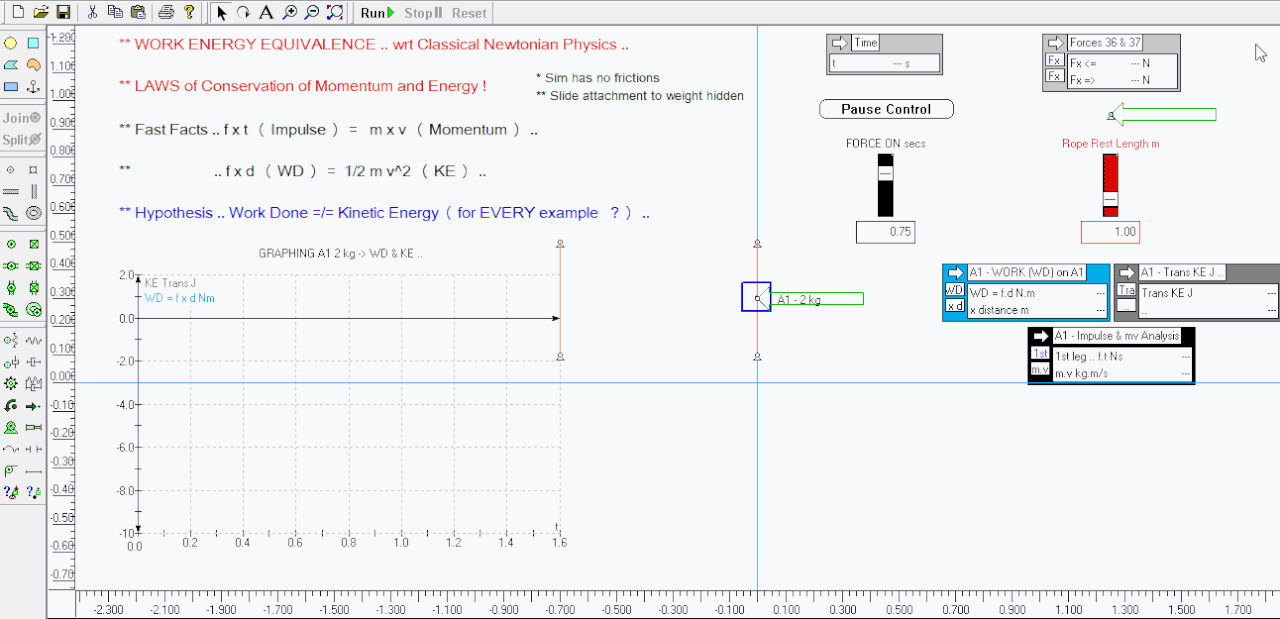
...............
Sims and animations attached .. gravity is on ,, no frictions ,, accuracy 1,000 fps ..
The first animation is a simple demonstration arrangement showing a 2 kg weight called A1 - a 5 Newton force is applied to it pushing it to the left ( -5 N ) - this force is applied for 0.75 seconds - the objects KE ( 1/2mv^2) and WD ( f.d ) are plotted on a graph ( n.b. the blue WD plot is on top of the black KE line which is directly beneath at every time interval ( they are lock-stepped ) ..
The sim is paused after 0.75 secs of run time - this is when the push force ceases ..
The side by side outputs show the comparisons between Work Done ( WD ) being force x distance ( fd ) and the Kinetic Energy ( KE ) the object gains directly from the push force applied .. the lower single output box shows the comparison between Impulse input ( ft ) given and the Linear Momentum ( mv ) gained ..
Summary ..
Force applied - -5.0 Ns
Time force applied = 0.75 secs
Weight mass/inertia = 2.0 kgs
Distance traveled = 0.703 m
Impulse => force x time => -5 x 0.75 = -3.75 N.s
Momentum gained => mass x velocity = -3.749 kgm/s ( say -3.75 kgm/s )
** Impulse Given = Momentum Gained i.e. f.t = m.v ** re .. Conservation of Momentum **
Work Done => force x distance => -5 x 0.703 => -3.515 N.m
Kinetic Energy => 1/2mv^2 = -3.514 J ( say -3.515 )
** Work Done = Kinetic Energy Gained i.e. f.d = 1/2mv^2 ** re .. Conservation of Energy **
...............
Summary .. as we would expect the stationary object is pushed left by a constant force for a limited time and gains both a maximum momentum and a maximum KE - the mv gained ( at any time slice ) is exactly equal to the impulse ( f.t ) given .. and the KE gained ( at any time slice ) is exactly equal to the Work Done ( f.d ) on it ..
Conclusion .. the Laws of Conservation of Momentum and Energy are confirmed in this sim - and the Theorem of Work Energy Equivalence is also confirmed because the impulse equals the momentum gain , and the Work Done equals the Kinetic Energy gain ..
A slam dunk for Laws of Conservation of Momentum and Energy, and the Work Energy Theorem ! ..
...............

...............
- Attachments
-
- WDtoKETest1A1.wm2d
- (15.46 KiB) Downloaded 16 times
Last edited by Fletcher on Wed Nov 13, 2024 9:17 pm, edited 1 time in total.
Re: Hypothesis .. Raising GPE without using Law of Levers ? ..
Thanks for the positive words Agor - I hope you enjoy the effort of the process - it will take a while to get it all sorted for publication and down in this thread in a coherent way ..agor95 wrote: Hi Fletcher
I have read your post and recognise the effort too find a way out of the confinement which we live with due to our education.Fletcher wrote: I will also start by discussing the Principle of Work Energy Equivalence ( or Work Energy Theorem ) - and hopefully show thru sims that Work Done is NOT ALWAYS EQUAL to Kinetic Energy in a mechanical system .. that will be a good start ..
Regards
** Sorry for your loss, tho words seem very inadequate - Best ..
Re: Hypothesis .. Raising GPE without using Law of Levers ? ..
In this next sim the first leg is the same as the last sim where a force is applied of -5 N for 0.75 secs to the 2 kg stationary object - this is followed immediately at the 0.75 secs mark by the second leg i.e. an equal but opposite force input of 5 N for a further time period of 0.75 secs ..
So we can see in the graph plots and outputs that Impulse given = Momentum gained ,, and WD = KE gained for both the 1st and the 2nd legs ..
This means the object steadily accelerates right up to the 0.75 secs mark then is steadily decelerated and is stationary again by the 1.50 sec mark ( 2 x 0.75 secs ) - IOW's, the weight is given an impulse which results in it gaining mv and KE, then after the same but opposite direction force input is applied the gains in mv and KE are reversed down to zero ..
As can been seen on the plot graph the WD plot ( blue line ) continues to build because it is measuring against x-axis distance covered - in physics terms WD is a vector ( KE is a scalar ) having magnitude and direction - so if direction is reversed and the object comes to a stop again then 2 equal shifts of work were done but in opposite directions canceling each other out - that is confirmed by the complete wash-off of all the mv and KE gains back to zero .. therefore impulse and WD thru both legs are also equal and opposite ..
** Momentum and Energy Conservation Laws confirmed as is the Work Energy Theorem ** everything has symmetry ** ..
>> So far, so good .. no surprises, yet .. <<
.. Back to my job for today of digging of a different kind ..
...............
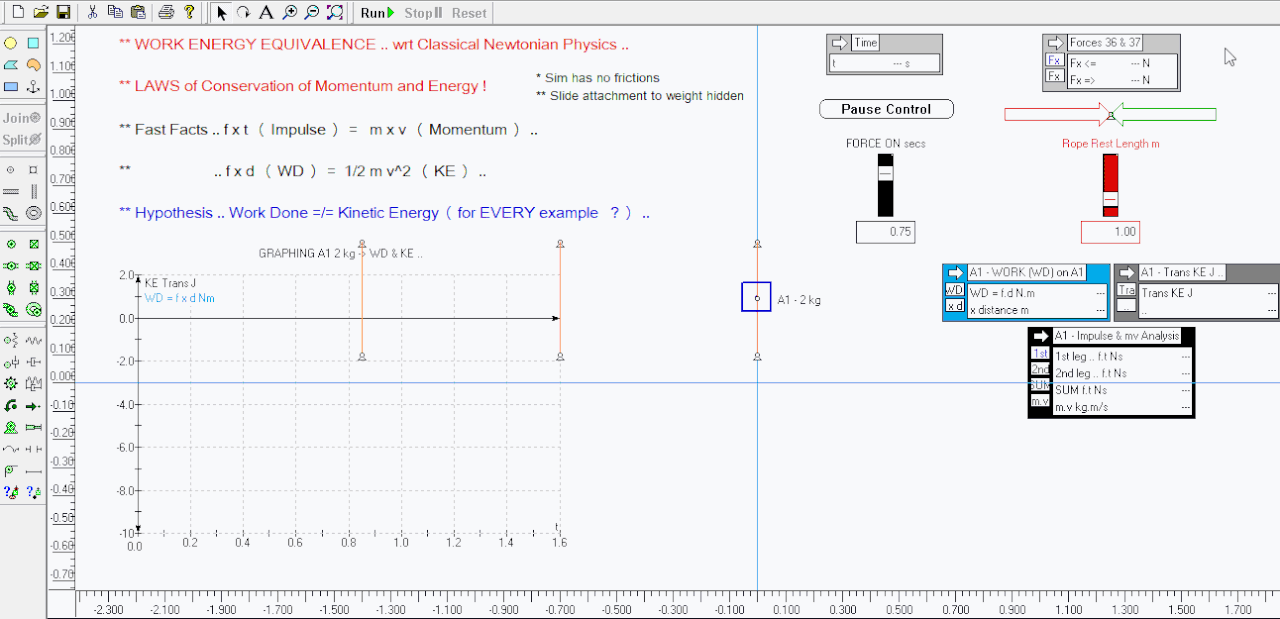
...............
So we can see in the graph plots and outputs that Impulse given = Momentum gained ,, and WD = KE gained for both the 1st and the 2nd legs ..
This means the object steadily accelerates right up to the 0.75 secs mark then is steadily decelerated and is stationary again by the 1.50 sec mark ( 2 x 0.75 secs ) - IOW's, the weight is given an impulse which results in it gaining mv and KE, then after the same but opposite direction force input is applied the gains in mv and KE are reversed down to zero ..
As can been seen on the plot graph the WD plot ( blue line ) continues to build because it is measuring against x-axis distance covered - in physics terms WD is a vector ( KE is a scalar ) having magnitude and direction - so if direction is reversed and the object comes to a stop again then 2 equal shifts of work were done but in opposite directions canceling each other out - that is confirmed by the complete wash-off of all the mv and KE gains back to zero .. therefore impulse and WD thru both legs are also equal and opposite ..
** Momentum and Energy Conservation Laws confirmed as is the Work Energy Theorem ** everything has symmetry ** ..
>> So far, so good .. no surprises, yet .. <<
.. Back to my job for today of digging of a different kind ..
...............

...............
- Attachments
-
- WDtoKETest1A2.wm2d
- (16.5 KiB) Downloaded 18 times
Re: Hypothesis .. Raising GPE without using Law of Levers ? ..
Continuing to build the background picture for today .. it is leading somewhere ..
Here is the same basic sim arrangement again - this time there is a second comparison sim running beneath the first - the top sim has a 2 kg weight ( A1 ) on a hidden sliding attachment, the one beneath has 2 x 1 kg weights ( B1 + B2 ) joined by a 0.5 meter massless rod so they act as one ( ganged ) .. Impulses are given to each comparison system at the same x-axis position as the visuals show ..
To recap .. there are 2 legs to the sims journey's starting from a stationary start - a green arrow Impulse of -5 N's is given for exactly 0.75 secs and then ceases, the original Impulse disappears and is replaced by an equal but opposite red arrow Impulse ( 5 N's for 0.75 secs ) - IOW's both systems are given the same momentum/impulse changes to their mass/inertia's so that they are accelerated and then are decelerated to a stop again ..
Results .. The outputs to the right show that everything is consistent and has symmetry - the Impulses ( f x t ) equal the Linear Momentum ( m x v ) changes to both systems ( total mass/inertia is the same ) - the Work Done in each leg ( WD ) ( f x d ) equals the Kinetic Energy ( KE ) ( 1/2mv^2 ) gained and then washed off thru both legs .. both systems behave and output in an identical manner ..
The graph plot only shows the A1 2 kg weight system - take it from me that the lower ganged 2 x 1 kg weights system shows the exact same results ( summed ) and would be beneath the A1 plot lines .. the sim visually shows that they are identical behaviour ..
...............
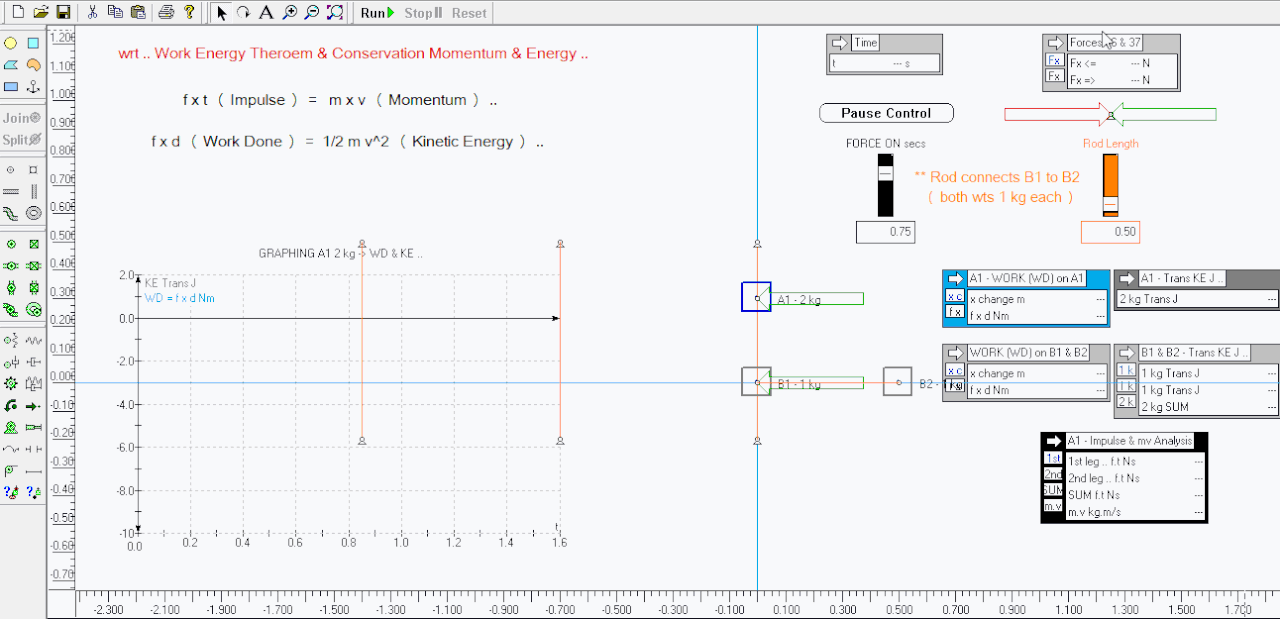
...............
Here is the same basic sim arrangement again - this time there is a second comparison sim running beneath the first - the top sim has a 2 kg weight ( A1 ) on a hidden sliding attachment, the one beneath has 2 x 1 kg weights ( B1 + B2 ) joined by a 0.5 meter massless rod so they act as one ( ganged ) .. Impulses are given to each comparison system at the same x-axis position as the visuals show ..
To recap .. there are 2 legs to the sims journey's starting from a stationary start - a green arrow Impulse of -5 N's is given for exactly 0.75 secs and then ceases, the original Impulse disappears and is replaced by an equal but opposite red arrow Impulse ( 5 N's for 0.75 secs ) - IOW's both systems are given the same momentum/impulse changes to their mass/inertia's so that they are accelerated and then are decelerated to a stop again ..
Results .. The outputs to the right show that everything is consistent and has symmetry - the Impulses ( f x t ) equal the Linear Momentum ( m x v ) changes to both systems ( total mass/inertia is the same ) - the Work Done in each leg ( WD ) ( f x d ) equals the Kinetic Energy ( KE ) ( 1/2mv^2 ) gained and then washed off thru both legs .. both systems behave and output in an identical manner ..
The graph plot only shows the A1 2 kg weight system - take it from me that the lower ganged 2 x 1 kg weights system shows the exact same results ( summed ) and would be beneath the A1 plot lines .. the sim visually shows that they are identical behaviour ..
...............

...............
- Attachments
-
- WDtoKETest1B2.wm2d
- (22.67 KiB) Downloaded 22 times
-
nebollinger
- Enthusiast

- Posts: 57
- Joined: Tue Sep 06, 2011 7:38 pm
Re: Hypothesis .. Raising GPE without using Law of Levers ? ..
I have tried the up and down matching masses numerous times and the "STICKING POINT" has always been the 180 degree rotation undoes what ever was accomplished. So combining that with something else as proposed is a possibility. Norman
-
nebollinger
- Enthusiast

- Posts: 57
- Joined: Tue Sep 06, 2011 7:38 pm
Re: Hypothesis .. Raising GPE without using Law of Levers ? ..
Here is my concept of wheels/rollers etc. see drawing. The drawing shows 4 positions but does not represent 4 rotating wheels but 2 rotating wheels. It shifts the mass to the right and up in both the top and lower half of the circle thus causing a continuous desired top heavy mass.
Norman
Norman
- Attachments
-
- wheels.pdf
- (17.26 KiB) Downloaded 35 times
-
nebollinger
- Enthusiast

- Posts: 57
- Joined: Tue Sep 06, 2011 7:38 pm
Re: Hypothesis .. Raising GPE without using Law of Levers ? ..
Here is a little better drawing. The question is Can the mass be moved 7 cm from DD to AA?
Remember we have inertia and levereage and mass balance all working hopefully in proper coordination.
Norman
Remember we have inertia and levereage and mass balance all working hopefully in proper coordination.
Norman
- Attachments
-
- wheels.pdf
- (17.85 KiB) Downloaded 32 times
Re: Hypothesis .. Raising GPE without using Law of Levers ? ..
I have built something like this in sim world before. It looks like it would have an advantage to lift the weights up on the inside of its movement, but there is not.
-
nebollinger
- Enthusiast

- Posts: 57
- Joined: Tue Sep 06, 2011 7:38 pm
Re: Hypothesis .. Raising GPE without using Law of Levers ? ..
I made a quick mockup of the weights. Using 2 shifted right makes it rotate right and then adding the weight at the top makes it rapidly rotate clockwise like a pendulum to 10 am.
I am not good at the simulators so I will leave that up to you and I do not have gears to try this out. I strongly hesitate to make my own from a belt with teeth because the smallest catch would ruin the test. So its up to the simulators at this point.
I will try Algodo??? but have not done well with gears in the past.
Norman
I am not good at the simulators so I will leave that up to you and I do not have gears to try this out. I strongly hesitate to make my own from a belt with teeth because the smallest catch would ruin the test. So its up to the simulators at this point.
I will try Algodo??? but have not done well with gears in the past.
Norman
Re: Hypothesis .. Raising GPE without using Law of Levers ? ..
IMO .. in the sim runs you are about to see things potentially begin to get far more interesting for the Work Energy Equivalence Theorem, and Classical Physics Conservations and Symmetry doctrine ..
In this first sim animation the "control" experiment is still the same as previous, plus a "compared" experiment of 2 x 1 kg ganged weights - this time the ganged pair are connected by a slack rope .. both the "control" and the "compared" are given the same momentum changes ( i.e. impulses ) - a force to the left of 5 N for 0.75 secs, which will be followed by an equal but opposite momentum change/impulse to the right direction ..
* The control mass/inertia of 2 kg was deliberately chosen so that I could easily divide in two for the comparison sim, and this would make comparing velocities and KE's and WD easy to calculate and see on screen ..
** This first animation is paused at 0.52 seconds just before the rope becomes taut and begins pulling the trailing B2 1 kg weight ..
Here is the results at 0.52 seconds paused .. see output boxes for values etc ..
n.b. the graph plot is for the compared ganged system this time around ..
Control .. distance = -0.38 m , v = 1.3 m/s , ( WD ) f x d = -1.69 Nm , KE = -1.69 J ..
Compared .. distance = -0.676 m , v = 2.6 m/s , ( WD ) f x d = -3.38 Nm , KE = -3.38 ..
.. We can see that the original impulse is given to both systems is identical - as we would expect momentum ( mv ) is given to both systems - this results at the 0.52 second mark when it is paused in the control 2 kg having -1.69 J of KE and having had Work Done on it of -1.69 Nm ( symmetry holding ) ..
.. For the comparison sim ( B1 of 1 kg ) it has traveled twice the distance ( 2 x the acceleration of the control ) and has twice the velocity .. because KE is a function of the square of the velocity, at these selected mass/inertia ratios the KE of the compared system is doubled compared to the "control" ( symmetry holding ) ..
>> I think everyone would agree that everything at this point is consistent and validates Symmetry and the Work Energy Principle, and Conservation of Momentum and Energy ..
When I come back the sim runs on to the next pause, and we look at that ..
...................
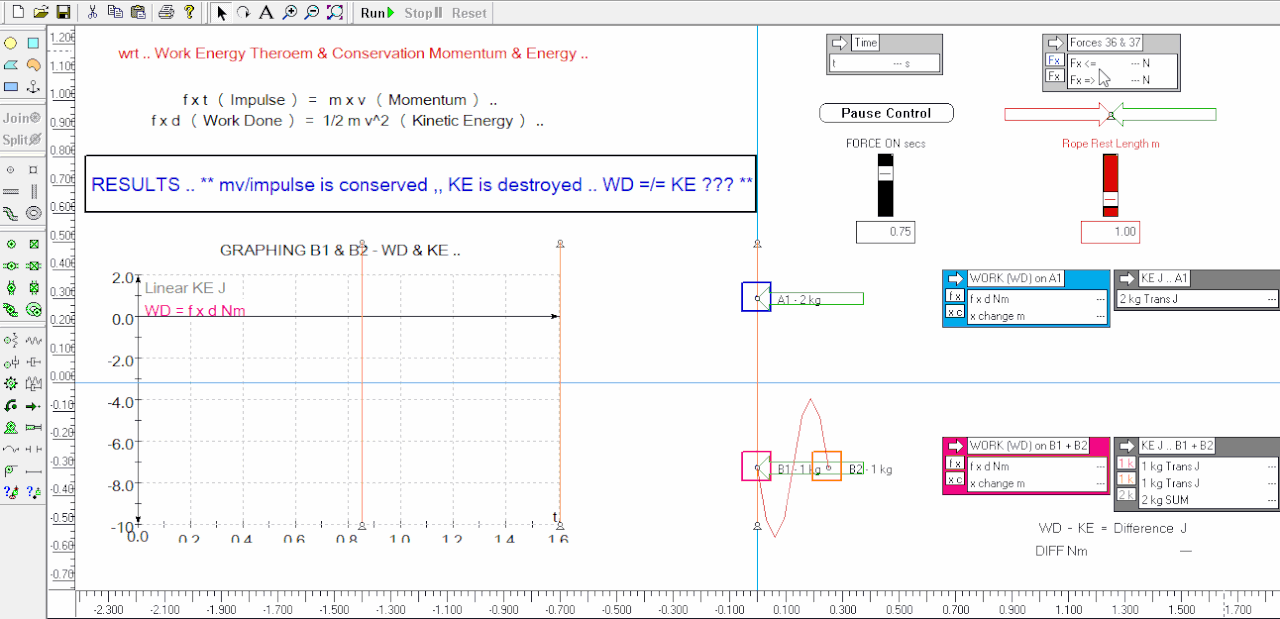
...................
In this first sim animation the "control" experiment is still the same as previous, plus a "compared" experiment of 2 x 1 kg ganged weights - this time the ganged pair are connected by a slack rope .. both the "control" and the "compared" are given the same momentum changes ( i.e. impulses ) - a force to the left of 5 N for 0.75 secs, which will be followed by an equal but opposite momentum change/impulse to the right direction ..
* The control mass/inertia of 2 kg was deliberately chosen so that I could easily divide in two for the comparison sim, and this would make comparing velocities and KE's and WD easy to calculate and see on screen ..
** This first animation is paused at 0.52 seconds just before the rope becomes taut and begins pulling the trailing B2 1 kg weight ..
Here is the results at 0.52 seconds paused .. see output boxes for values etc ..
n.b. the graph plot is for the compared ganged system this time around ..
Control .. distance = -0.38 m , v = 1.3 m/s , ( WD ) f x d = -1.69 Nm , KE = -1.69 J ..
Compared .. distance = -0.676 m , v = 2.6 m/s , ( WD ) f x d = -3.38 Nm , KE = -3.38 ..
.. We can see that the original impulse is given to both systems is identical - as we would expect momentum ( mv ) is given to both systems - this results at the 0.52 second mark when it is paused in the control 2 kg having -1.69 J of KE and having had Work Done on it of -1.69 Nm ( symmetry holding ) ..
.. For the comparison sim ( B1 of 1 kg ) it has traveled twice the distance ( 2 x the acceleration of the control ) and has twice the velocity .. because KE is a function of the square of the velocity, at these selected mass/inertia ratios the KE of the compared system is doubled compared to the "control" ( symmetry holding ) ..
>> I think everyone would agree that everything at this point is consistent and validates Symmetry and the Work Energy Principle, and Conservation of Momentum and Energy ..
When I come back the sim runs on to the next pause, and we look at that ..
...................

...................
Last edited by Fletcher on Sat Nov 16, 2024 12:50 am, edited 1 time in total.
Re: Hypothesis .. Raising GPE without using Law of Levers ? ..
The next animation runs on the sim from the first pause at 0.52 seconds in the above post to the second pause at 0.75 secs ( completing the first leg of the momentum change to the systems ) - what trickery is this I hear you ask ? ..
Soon after the 0.52 second mark the rope ( massless ) goes taut and pulls along the B2 1 kg weight ganged to B1 1 kg weight being given the impulse ..
The first things we notice is the B1 weight almost immediately halves its velocity and its KE, and the trailing B2 weight almost immediately gains the same velocity and KE - we would expect that the comparison would have the same velocities as the control and the same momentums, and it does .. but this means that its combined KE of the comparison sim drops to equal the controls at the same time period .. at 0.75 seconds pause ..
Control .. distance = -0.703 m , v = -1.875 m/s , ( WD ) f x d = -3.516 Nm , KE = -3.514 J ..
Compared .. distance = -1.078 m , v = -1.875 m/s , ( WD ) f x d = -5.391 Nm , KE = -3.514 J .. WD - KE = -1.877 Nm
* at end of first leg - Momentum is conserved , Kinetic Energy is a function of final velocity and is the same as the controls ( since they have the same velocities ) , however there has been a dramatic drop in Previous Maximum KE , but most surprisingly imo the WD in the compared system is far greater than the final KE i.e. -5.391 - -3.514 = -1.877 Nm ..
IMO the WD does not equal the final KE for the first leg of the experiment !
>> IOW's , the Work Energy Equivalence Theorem may in some mechanical instances/examples be unreliable i.e. fallible .. however, it appears that momentum changes are still a valid coherent proposition .. this proposed 'vulnerability' could potentially lead the way to breaking classical symmetry and finding a mechanical workaround to exploit the possible loophole, imo ..
** I suggest having a good think about what was fundamentally different between the control and the compared sims, and running your own sims as a check and validation exercise etc !
.....................
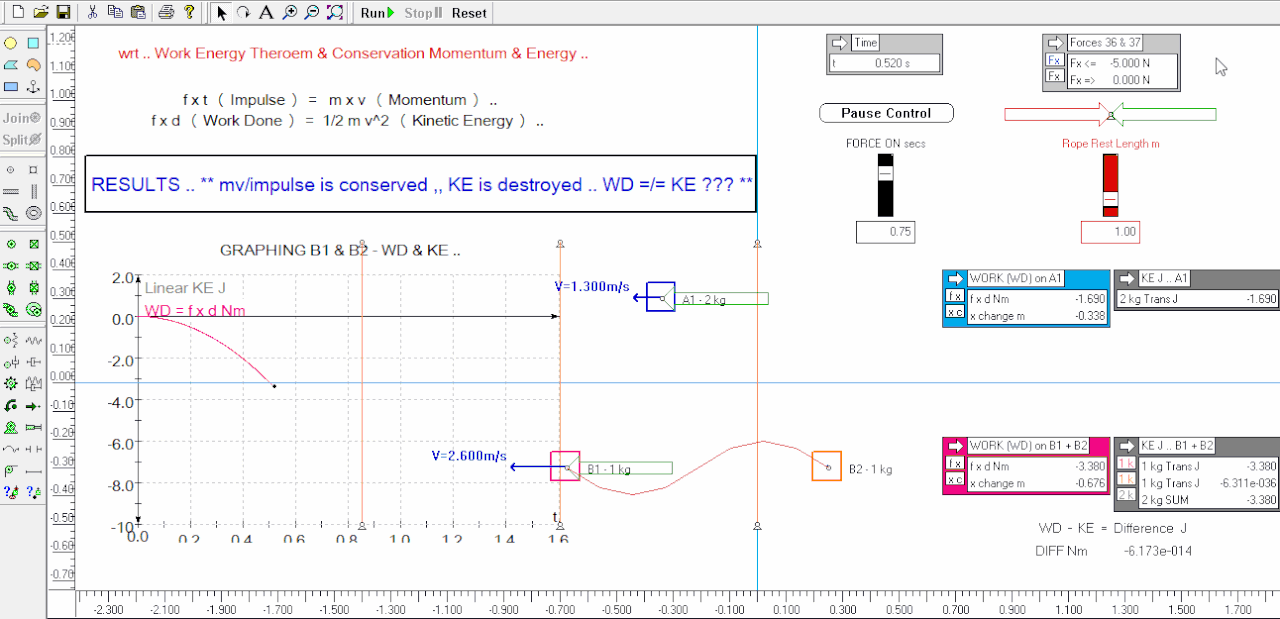
.....................
Soon after the 0.52 second mark the rope ( massless ) goes taut and pulls along the B2 1 kg weight ganged to B1 1 kg weight being given the impulse ..
The first things we notice is the B1 weight almost immediately halves its velocity and its KE, and the trailing B2 weight almost immediately gains the same velocity and KE - we would expect that the comparison would have the same velocities as the control and the same momentums, and it does .. but this means that its combined KE of the comparison sim drops to equal the controls at the same time period .. at 0.75 seconds pause ..
Control .. distance = -0.703 m , v = -1.875 m/s , ( WD ) f x d = -3.516 Nm , KE = -3.514 J ..
Compared .. distance = -1.078 m , v = -1.875 m/s , ( WD ) f x d = -5.391 Nm , KE = -3.514 J .. WD - KE = -1.877 Nm
* at end of first leg - Momentum is conserved , Kinetic Energy is a function of final velocity and is the same as the controls ( since they have the same velocities ) , however there has been a dramatic drop in Previous Maximum KE , but most surprisingly imo the WD in the compared system is far greater than the final KE i.e. -5.391 - -3.514 = -1.877 Nm ..
IMO the WD does not equal the final KE for the first leg of the experiment !
>> IOW's , the Work Energy Equivalence Theorem may in some mechanical instances/examples be unreliable i.e. fallible .. however, it appears that momentum changes are still a valid coherent proposition .. this proposed 'vulnerability' could potentially lead the way to breaking classical symmetry and finding a mechanical workaround to exploit the possible loophole, imo ..
** I suggest having a good think about what was fundamentally different between the control and the compared sims, and running your own sims as a check and validation exercise etc !
.....................

.....................
Re: Hypothesis .. Raising GPE without using Law of Levers ? ..
The second leg ..
Sim attached - this is an initial study ..
.....................
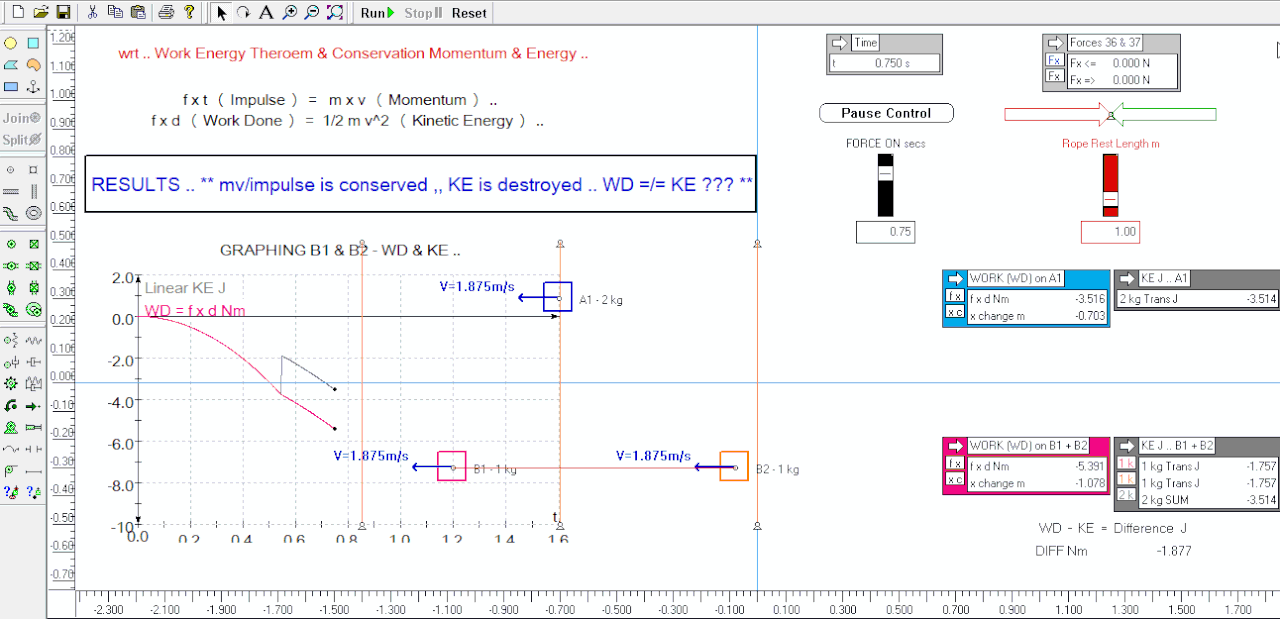
.....................
Sim attached - this is an initial study ..
.....................

.....................
- Attachments
-
- WDtoKETest1E1.wm2d
- (23.27 KiB) Downloaded 22 times
Last edited by Fletcher on Sat Nov 16, 2024 2:08 am, edited 1 time in total.
- John Collins
- Addict

- Posts: 3300
- Joined: Wed Nov 05, 2003 6:33 am
- Location: Warwickshire. England
- Contact:
Re: Hypothesis .. Raising GPE without using Law of Levers ? ..
Hi fletch, I have the highest regard for you and your work, so it’s with regret that I have to admit that I don’t understand what I’m seeing in your sims. That’s not your fault, but entirely mine. I’ve never been able to get a handle on sims although I get your hypotheses in general. I encourage you to continue your task and if you wonder why I don’t comment on them it’s not a silent criticism but more a case of coming too late to the table to learn what you all already understand.
Having said that I continue working on my own models without the use of sims, preferring the hands-on technique that I have become so used to over the last 50 years or so. My optimism remains undiminished and I plan an update about my progress in the near future.
JC.
Having said that I continue working on my own models without the use of sims, preferring the hands-on technique that I have become so used to over the last 50 years or so. My optimism remains undiminished and I plan an update about my progress in the near future.
JC.
Read my blog at http://johncollinsnews.blogspot.com/
This is the link to Amy’s TikTok page - over 20 million views for one video! Look up amyepohl on google
See my blog at http://www.gravitywheel.com
This is the link to Amy’s TikTok page - over 20 million views for one video! Look up amyepohl on google
See my blog at http://www.gravitywheel.com